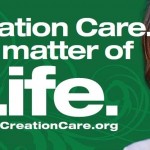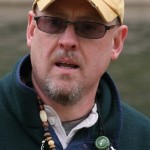by Alexei Laushkin
1. Why did you choose to become the Executive Director of Au Sable? 
I spent some time, in prayer, reflection, and fasting, working to answer three questions: could I do the job, did I want to do the job, and should I apply to do the job. I found, over time, that the answer I received to all three questions was yes. I increasingly felt called to be a part of leading Au Sable’s ministries in caring for creation.
2. What is your vision for the Institute under your leadership?
I believe God has formed and sustained Au Sable to accomplish major ministries. Au Sable is to teach others the knowledge and skills needed to serve and protect God’s creation. As Wendell Berry has said, you cannot practice virtue without skill, and conservation of our natural world should be understood first as a virtue applied to the best and highest ends of creation care. It is a virtue informed by science and technology, but it is fundamentally a moral choice.
Through Au Sable we will create new knowledge and understanding in ethics and theology applicable to the care of God’s creation, a way of seeing, understanding, and obeying biblical and moral principles that apply directly to serving and protecting God’s creation. To accomplish this, I intend to revive our former practice of regular conferences and forums, and the publications they produced, that address these issues.
We plan to grow into an increasingly substantive and serious role in creating new knowledge and understanding about how God’s create works. In other words, to increase its role in scientific research aimed at understanding, preserving, and restoring God’s creation.
Au Sable should play a role in creating, nurturing and expanding a community of Christians actively engaged in the care of God’s creation, both among our own alumni and with those doing similar work who are not our alumni. Au Sable is provide the means, incentive and resources for people in this community to gather & grow together for common purpose.
3. What do you see as the challenges and opportunities facing the current student generation?
The one that comes to mind is the rising tide and power of secular and materialist culture. Almost all social and cultural supports that, in the past, encouraged and pointed toward Christian faith have been stripped away from daily life. Today almost every form of cultural and social guidance, and every kind of personal reinforcement, directs people to measure themselves by their material possessions and accomplishments in this present life, and to do so without reference to God or to any enduring moral standard. Modern society is determined to create the intellectually and psychologically satisfied secularist, the person who not only does not believe in God, but never even thinks of God. Every major cultural force is now pressing people to conform to this mold.
4. How can the current student generation be faithful stewards of God’s creation?
First, through informed study and careful observation of what God’s creation really is and how it works. On these matters take science and technology seriously. Gain knowledge, skills and competencies that will help you understand and then begin to solve real environmental problems.
Second, engage in sacrificial concern for God’s creation. I place the adjective “sacrificial” before the noun “concern” to remind us not to commit the sin James warned his readers about, the shallowness of seeing someone in need and saying, “Good luck! Be warmed and be filled.” Every person possesses some measure of creation’s resources in this present life. Do not invest them all in yourself. Invest your ability, effort, time, knowledge, personal influence and money in meeting the needs of others, including non-human others, species that need space and habitat, and the resources in it, to share this world with us.
For more info, visit www.AuSable.org













